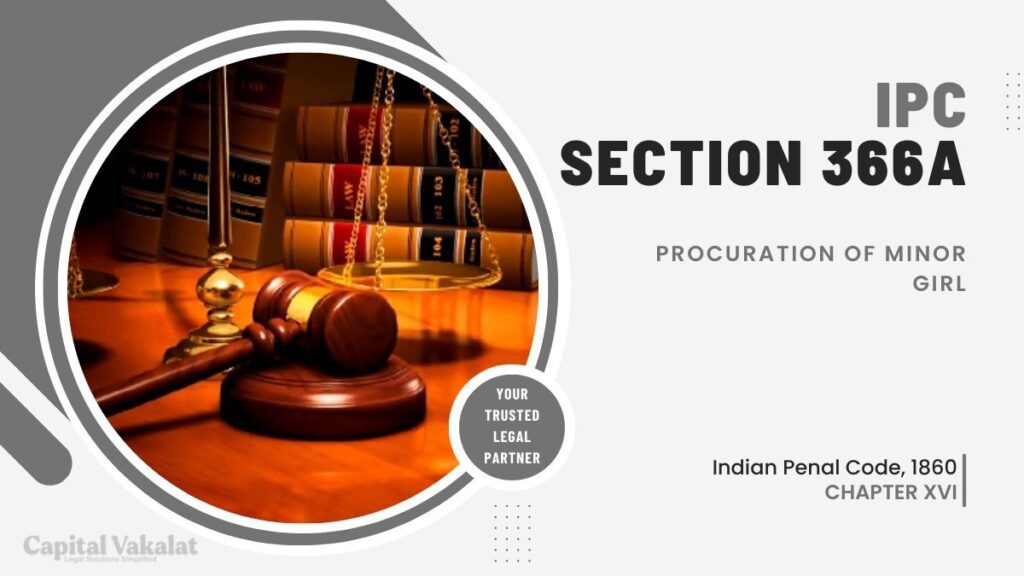In the complex tapestry of legal statutes, Section 366A of the Indian Penal Code (IPC) stands as a sentinel against a grievous crime that strikes at the heart of society — the procuration of minor girls.

This article delves into the nuances of Section 366A IPC, dissecting its legal implications, contextualizing the problem, and exploring the various facets surrounding this issue.
Understanding Section 366A IPC
Section 366A of the IPC deals explicitly with the procurement of a minor girl for illicit purposes. It criminalizes actions that involve enticing or kidnapping a minor girl for forced marriage or sexual exploitation. Offenders under this section face stringent penalties, including imprisonment.
Contextualizing the Problem
To truly grasp the severity of the issue, one must confront the stark realities. Statistics on the prevalence of procuration of minor girls paint a grim picture. Every number represents a life marred by exploitation and a childhood stolen. Real-life examples bring home the urgency of addressing this problem, showcasing the dire need for stringent measures.
Factors Contributing to Procuration
Examining the roots of the problem reveals a complex interplay of social and economic factors. Poverty, lack of education, and societal vulnerabilities contribute to the exploitation of minors. Understanding these factors is crucial for developing comprehensive strategies to tackle the issue at its roots.
Impact on Victims
The repercussions of procuration extend far beyond the immediate act. Victims, often young girls, bear the brunt of severe psychological and emotional trauma. This section explores the long-term effects on the well-being of these minors, emphasizing the urgent need for rehabilitation and support systems.
Challenges in Prosecution
While the law exists to punish offenders, the legal journey is fraught with challenges. From evidentiary issues to societal biases, hurdles in prosecution hinder the swift delivery of justice. This section sheds light on the complexities of bringing perpetrators to book and calls for reforms in the legal framework.
Role of Society and Awareness
Procuration of minor girls is not just a legal issue; it is a societal problem. Active community involvement is essential to curbing this crime. Raising awareness about the signs of exploitation and encouraging reporting can act as powerful deterrents. This section emphasizes the role of society in protecting its most vulnerable members.
Government Initiatives
The Indian government has enacted various laws and initiatives to combat the trafficking of minors. While these efforts are commendable, there is always room for improvement. This section provides an overview of existing legal provisions and suggests areas for strengthening the framework to ensure a more effective response.
Global Perspective
Examining anti-trafficking laws on a global scale provides valuable insights. A comparative analysis reveals successful strategies employed by other nations. Drawing from these experiences, India can refine its approach to tackling procuration and human trafficking.
Conclusion
In conclusion, Section 366A IPC is a crucial weapon in the legal arsenal against the procuration of minor girls. The multifaceted nature of this issue demands a holistic approach involving legal reforms, societal awareness, and international cooperation. As a society, we must stand united against the exploitation of our most vulnerable members, ensuring a safer and more secure future for all.
Frequently Asked Questions
What are the penalties for offenders under Section 366A IPC?
Offenders face stringent penalties, including imprisonment, as prescribed by the Indian legal system.
How prevalent is the issue of procuration of minor girls in India?
Statistics indicate a concerning prevalence, highlighting the urgent need for collective action to address the problem.
What role does society play in preventing the procuration of minor girls?
Active community involvement and awareness are crucial in preventing and reporting cases of exploitation.
Are there international efforts to combat procuration and human trafficking?
Yes, various countries have implemented successful strategies, providing valuable lessons for global collaboration against these crimes.